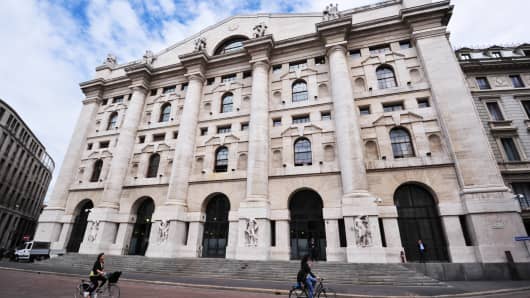But the mere threat drew attention.
Short selling involves borrowing shares to sell, then buying them back at a later date in hopes of them falling in value. The successful short-seller pockets the difference between prices.
(Read More: What Is Stock Shorting? CNBC Explains)
"Bans on short selling are often politically driven and usually a sign of underlying economic problems," David Lewis, EMEA head of SunGard Astec Analytics, said in assessing the threat.
"Many studies have shown that such bans do little to support share prices (while) damaging liquidity and widening spreads which are both bad news for investors," he added. "Short selling allows proper price discovery and is part and parcel of an efficient capital market."
The markets overall took a huge hit after Italian election results pointed to the possibility of an unmanageable government that might undo the reforms instituted to keep the country in the euro zone.
Consob already has instituted short-term bans on two banks that got hammered in Monday trading.
But previous bans have been ineffective and often achieve the opposite of their intention.
The seminal study of how shorting bans go wrong came from the New York Federal Reserve, which examined a similar move as the financial crisis struck in September 2008. The 2012 study, authored by Robert Battalio, Hamid Mehran and Paul Schultz, concluded that short-selling bans in the U.S. and elsewhere proved costly and ineffective.
"The bans had little impact on stock prices," the study said. "Even with the bans in place, prices continued to fall. At the same time, the bans lowered market liquidity and increased trading costs."
For the Sept. 18-Oct. 8 period in 2008 the report estimates that the ban increased trading costs on U.S. equities options by $500 million while the market continued its decline.
"If anything, the bans seem to have the unwanted effects of raising trading costs, lowering market liquidity and preventing short-sellers from rooting out cases of fraud and earnings manipulation," the report said.
(Read More: Here's What Could Put the Brakes on Market Rally)
Moreover, such bans tend to send the wrong message.
"A short-selling ban would signal that they're really starting to panic," said Boris Schlossberg, managing director at BK Asset Management. "As a result it's probably going to have unintended consequences."
One possible unintended consequence: Schlossberg sees a breakdown in the euro-dollar trade, with the euro weakening against the American currency as investors look for denominations in countries where shorting is not limited. The trade was relatively flat Tuesday with the euro at about 1.30, a level that Schlossberg feels is important.
That dollar strength in turn could put downward pressure on U.S. stock prices, which have been sensitive to a rising greenback.
"If you get to the point of a free-fall in European equities there's no way I could see U.S. stocks being able to absorb that without taking a hit," Schlossberg said.
Another argument against the ban is that shorting is so high-risk right now that very few traders are likely to engage in much of it for more than brief periods.
Monetary policy has been the most important element in market performance, so with the U.S. Federal Reserve and European Central Bank firmly committed to cheap-money policies as long as the global economy remains in turmoil, a bet against stocks is high-risk.
"Why would you want to line up against the central bank?" said Hans Olsen, head of investment strategy for the Americas at Barclays Wealth. "They'll crush you. That seems to be an asymmetric trade."
Olsen is among the crowd that things a shorting ban is "an overreaction."
"That doesn't work. It's never worked," he said. "It just upsets people."





